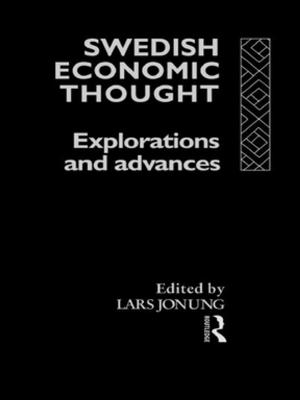| Author: | Kumaraswamy Vela Velupillai | ISBN: | 9781134385454 |
| Publisher: | Taylor and Francis | Publication: | November 22, 2017 |
| Imprint: | Routledge | Language: | English |
| Author: | Kumaraswamy Vela Velupillai |
| ISBN: | 9781134385454 |
| Publisher: | Taylor and Francis |
| Publication: | November 22, 2017 |
| Imprint: | Routledge |
| Language: | English |
Herbert Simon (1916-2001) is mostly celebrated for the theory of bounded rationality and satisficing. This book of essays on Models of Simon tackles these topics that the he broached in a professional career spanning more than 60 years. Expository material on the fundamental concepts he introduced are re-interpreted in terms of the theory of computability.
This volume frames the behavioural issues of concern for economists, such as: hierarchy, causality, near-diagonal linear dynamical systems, discovery, the contrasts between the notion of heuristics*,* andthe Church-Turing Thesis of Computability Theory. There is, consistently, an emphasis on the historical origins of the concepts Simon worked with, in emphasising Human Problem Solving and Decision Making – by rational individuals and institutions (like Organizations). The main feature of the results in the book are its emphasis on the procedural aspects of human problem solving, decision making and the remarkable way Simon harnessed many tools of mathematical logic, mathematics, cognitive sciences, economics and econometrics.
This long-awaited volume is an important read for those who study economic theory and philosophy, microeconomics and political economy, as well as those interested in the great Herbert Simon’s work.
Herbert Simon (1916-2001) is mostly celebrated for the theory of bounded rationality and satisficing. This book of essays on Models of Simon tackles these topics that the he broached in a professional career spanning more than 60 years. Expository material on the fundamental concepts he introduced are re-interpreted in terms of the theory of computability.
This volume frames the behavioural issues of concern for economists, such as: hierarchy, causality, near-diagonal linear dynamical systems, discovery, the contrasts between the notion of heuristics*,* andthe Church-Turing Thesis of Computability Theory. There is, consistently, an emphasis on the historical origins of the concepts Simon worked with, in emphasising Human Problem Solving and Decision Making – by rational individuals and institutions (like Organizations). The main feature of the results in the book are its emphasis on the procedural aspects of human problem solving, decision making and the remarkable way Simon harnessed many tools of mathematical logic, mathematics, cognitive sciences, economics and econometrics.
This long-awaited volume is an important read for those who study economic theory and philosophy, microeconomics and political economy, as well as those interested in the great Herbert Simon’s work.















